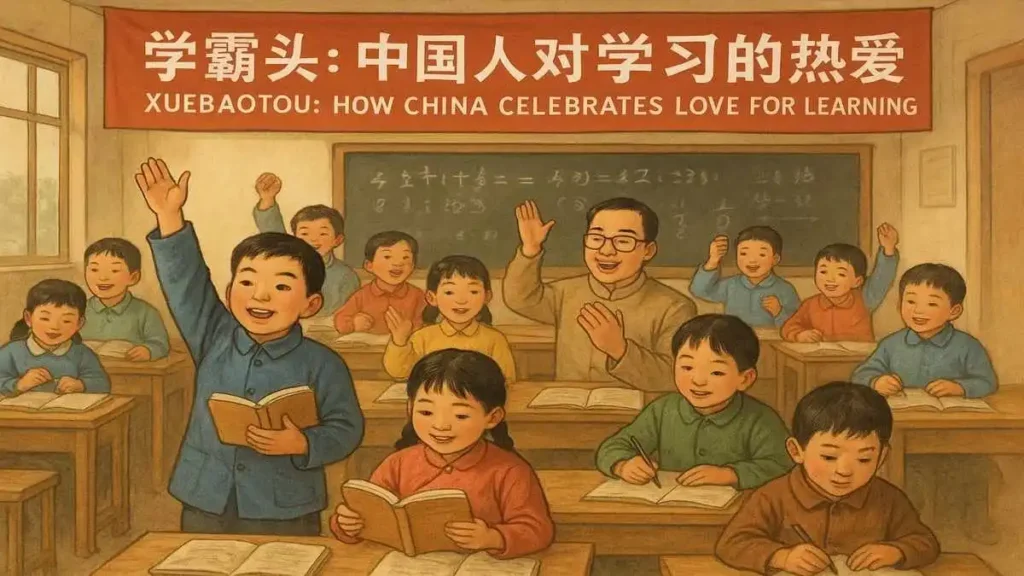In today’s fast-paced digital era, language evolves faster than ever, especially among China’s vibrant online communities. One such fascinating example is “Xuebaotou”, a modern Chinese slang term that charmingly combines xué (“study” or “learn”), bǎo (“treasure” or “precious”), and tóu (“head” or “person”). Literally translated, it means “study treasure head,” but in everyday use, it affectionately refers to someone deeply passionate about learning, an enthusiastic “study nerd” who finds joy in education.
Table of Contents
Defining Xuebaotou
The word Xuebaotou is a creative portmanteau composed of three Chinese characters:
- “Xué”: meaning “study” or “learn,”
- “Bǎo”: meaning “treasure” or “precious,” and
- “Tóu”: meaning “head” or “person.”
When combined, the term loosely translates to “study treasure head” or “learning treasure person.” However, its real charm lies in its colloquial nuance—it affectionately refers to someone who is deeply dedicated to studying, often excelling in academics, and embodying the archetype of a “study nerd” or “academic genius.”
READ ALSO: Kirby Dedo: The Bizarre Meme Uniting Fans Worldwide
How Xuebaotou Differs from Other Academic Slang
Chinese internet culture features a spectrum of academic-related slang, each carrying distinct connotations:
- Xuébà: “Study overlord.” Refers to an elite student who consistently ranks at the top. It conveys admiration and respect, sometimes mixed with envy.
- Xuéshén: “Study god.” A hyperbolic term for a student of near-supernatural intelligence.
- Xuézāi: “Study scum.” Used self-deprecatingly to describe a poor-performing student, often as a comic contrast to Xuébà.
- Xuebaotou: Softer and more affectionate than Xuébà. It emphasizes passion for learning rather than pure results.
Why Xuebaotou Still Matters Today
- Celebrates the Joy of Learning: It encourages people to view studying not as a chore but as a fulfilling, enjoyable pursuit.
- Redefines Academic Identity: It shifts the perception of “study nerds” from being socially awkward to being admirable and relatable figures.
- Promotes Lifelong Learning: The term resonates beyond schools, inspiring people of all ages to stay curious and continue learning new skills.
- Reflects Modern Chinese Youth Culture: Itshowcases the humor, creativity, and self-awareness of China’s younger generation.
- Balances Tradition and Modernity: It preserves China’s deep respect for education while adapting it to today’s playful, digital communication style.
How to Identify the Perfect Xuebaotou Personality
1. Genuine Love for Learning:
- A true student studies not out of obligation but out of curiosity and joy for knowledge.
- They find excitement in discovering new ideas and often explore topics beyond the classroom.
2. Consistent Dedication:
- The perfect it maintain steady study habits, balancing focus with discipline.
- Their consistency reflects passion, not pressure.
3. Positive Study Attitude:
- They see learning as a journey, not a race.
- Instead of boasting about grades, they celebrate progress and effort.
4. Creative Problem-Solving:
- A hallmark of its personalities is their ability to think critically and innovatively.
- They enjoy connecting concepts across different subjects.

Visual Suggestions for Understanding Xuebaotou
- Cartoon of a cheerful student surrounded by books and notes
- Illustration of a “study treasure” character holding a glowing textbook
- Infographic showing evolution from “Xuébà” to “Xuebaotou”
- Comic strip of a student proudly calling themselves an Xuebaotou
- Cute sticker-style icons: pencils, glasses, coffee, and laptops
Cultural Context: Education and Identity in China
To fully understand the resonance of it, one must consider China’s deep-rooted cultural emphasis on education. Academic excellence has long been a cornerstone of Chinese society, dating back to the imperial examination system (keju), where scholarly ability determined one’s social status and career prospects.
In the modern era, this reverence for learning persists, reinforced by competitive school systems and national pride in educational achievement. For many students, the pursuit of knowledge is not merely a personal endeavor but a social expectation—one tied to family honor and future success.
Why Xuebaotou Resonates with the Digital Generation
- Emotional relatability: It reflects shared experiences of exam stress, late-night studying, and the pursuit of self-improvement.
- Cultural evolution: It modernizes traditional respect for education into something casual and fun.
- Internet aesthetics: Its cute, catchy sound and visual playfulness make it perfect for memes and hashtags.
- Empowerment through humor: It transforms anxiety about grades into self-affirming humor, helping students find joy in learning.
By using the term, young people reclaim the narrative of academic life—turning pressure into pride, and study into style.
The Global Relevance of Xuebaotou
While it is rooted in the Chinese language and culture, its underlying sentiment transcends borders. Around the world, students and lifelong learners share the same joys and struggles of studying, striving, and growing. The global digital era has amplified this universality—study aesthetics, productivity content, and “studygram” communities on platforms like TikTok and Instagram mirror the Xuebaotou mindset: celebrating learning as a lifestyle.
How Xuebaotou is Made, Craftsmanship Insights
- Cultural Fusion: Born from blending traditional respect for scholars with modern internet humor.
- Linguistic Creativity: Combines xué (study), bǎo (treasure), and tóu (person) to form a playful identity.
- Emotional Design: Crafted to sound affectionate, turning academic seriousness into warmth.
- Digital Evolution: Popularized through memes, hashtags, and study-themed videos on Chinese social media.
- Youth Influence: Created by students to express pride, humor, and relatability in academic life.
FAQs
Q1: Is “Xuebaotou” the same as “Xueba”?
No. While Xueba refers to a top student or academic overachiever, it carries a softer, more affectionate tone. It celebrates enthusiasm and effort, not just results.
Q2: Can I call myself an “Xuebaotou”?
Yes! Many people use it humorously to describe themselves when they’re studying hard or enjoying learning. It’s often a badge of self-motivation.
Q3: Is “Xuebaotou” used only among students?
Mostly yes, but it’s also used affectionately for adults who love learning, whether through books, hobbies, or professional growth.
Conclusion
Itis more than just a trendy slang term; it’s a reflection of evolving cultural values. In a world that often equates success with stress, this term offers a refreshing reminder that studying can be joyful, humorous, and deeply personal.
By blending tradition with internet creativity, it captures the heart of a generation that values both knowledge and authenticity. It celebrates the learner within us all, the curious, determined, and sometimes slightly sleep-deprived Xuebaotou who keeps growing, one chapter at a time.


